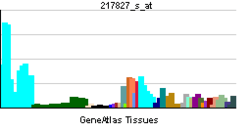SPG21
| Spastic paraplegia 21 (autosomal recessive, Mast syndrome) | |||||||||||||
|---|---|---|---|---|---|---|---|---|---|---|---|---|---|
| Identifiers | |||||||||||||
| Symbols | SPG21 ; ACP33; GL010; MAST | ||||||||||||
| External IDs | OMIM: 608181 MGI: 106403 HomoloGene: 9603 GeneCards: SPG21 Gene | ||||||||||||
| |||||||||||||
| RNA expression pattern | |||||||||||||
 | |||||||||||||
| More reference expression data | |||||||||||||
| Orthologs | |||||||||||||
| Species | Human | Mouse | |||||||||||
| Entrez | 51324 | 27965 | |||||||||||
| Ensembl | ENSG00000090487 | ENSMUSG00000032388 | |||||||||||
| UniProt | Q9NZD8 | Q9CQC8 | |||||||||||
| RefSeq (mRNA) | NM_001127889 | NM_138584 | |||||||||||
| RefSeq (protein) | NP_001121361 | NP_613050 | |||||||||||
| Location (UCSC) | Chr 15: 65.26 – 65.28 Mb | Chr 9: 65.46 – 65.49 Mb | |||||||||||
| PubMed search | |||||||||||||
Maspardin is a protein that in humans is encoded by the SPG21 gene.[1][2][3]
The protein encoded by this gene was identified by a two-hybrid screen using CD4 as the bait. It binds to the hydrophobic C-terminal amino acids of CD4 which are involved in repression of T cell activation. The interaction with CD4 is mediated by the noncatalytic alpha/beta hydrolase fold domain of this protein. It is thus proposed that this gene product modulates the stimulatory activity of CD4.[3]
Interactions
SPG21 has been shown to interact with CD4.[1]
References
- ↑ 1.0 1.1 Zeitlmann L, Sirim P, Kremmer E, Kolanus W (Mar 2001). "Cloning of ACP33 as a novel intracellular ligand of CD4". J Biol Chem 276 (12): 9123–32. doi:10.1074/jbc.M009270200. PMID 11113139.
- ↑ Simpson MA, Cross H, Proukakis C, Pryde A, Hershberger R, Chatonnet A, Patton MA, Crosby AH (Oct 2003). "Maspardin Is Mutated in Mast Syndrome, a Complicated Form of Hereditary Spastic Paraplegia Associated with Dementia". Am J Hum Genet 73 (5): 1147–56. doi:10.1086/379522. PMC 1180493. PMID 14564668.
- ↑ 3.0 3.1 "Entrez Gene: SPG21 spastic paraplegia 21, maspardin (autosomal recessive, Mast syndrome)".
Further reading
- Cross HE, McKusick VA (1967). "The mast syndrome. A recessively inherited form of presenile dementia with motor disturbances". Arch. Neurol. 16 (1): 1–13. doi:10.1001/archneur.1967.00470190005001. PMID 6024251.
- Maruyama K, Sugano S (1994). "Oligo-capping: a simple method to replace the cap structure of eukaryotic mRNAs with oligoribonucleotides". Gene 138 (1–2): 171–4. doi:10.1016/0378-1119(94)90802-8. PMID 8125298.
- Suzuki Y, Yoshitomo-Nakagawa K, Maruyama K et al. (1997). "Construction and characterization of a full length-enriched and a 5'-end-enriched cDNA library". Gene 200 (1–2): 149–56. doi:10.1016/S0378-1119(97)00411-3. PMID 9373149.
- Strausberg RL, Feingold EA, Grouse LH et al. (2003). "Generation and initial analysis of more than 15,000 full-length human and mouse cDNA sequences". Proc. Natl. Acad. Sci. U.S.A. 99 (26): 16899–903. doi:10.1073/pnas.242603899. PMC 139241. PMID 12477932.
- Ota T, Suzuki Y, Nishikawa T et al. (2004). "Complete sequencing and characterization of 21,243 full-length human cDNAs". Nat. Genet. 36 (1): 40–5. doi:10.1038/ng1285. PMID 14702039.
- Gerhard DS, Wagner L, Feingold EA et al. (2004). "The Status, Quality, and Expansion of the NIH Full-Length cDNA Project: The Mammalian Gene Collection (MGC)". Genome Res. 14 (10B): 2121–7. doi:10.1101/gr.2596504. PMC 528928. PMID 15489334.
- Rual JF, Venkatesan K, Hao T et al. (2005). "Towards a proteome-scale map of the human protein-protein interaction network". Nature 437 (7062): 1173–8. doi:10.1038/nature04209. PMID 16189514.